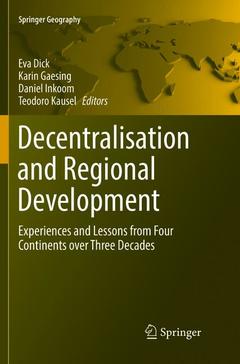Decentralisation and Regional Development, 1st ed. 2016 Experiences and Lessons from Four Continents over Three Decades Springer Geography Series
Coordonnateurs : Dick Eva, Gaesing Karin, Inkoom Daniel, Kausel Teodoro

This book analyzes decentralisation, regional development paths and success factors in different governance sectors in Ghana, the Philippines, Tanzania and Chile, and discuss overarching aspects of relevance. Decentralisation, which refers to the delegation of administrative responsibilities, political decision-making and fiscal powers to lower levels of government, is now considered one of the most efficient engines of development. In Sub-Saharan Africa decentralised states have made more progress in reducing poverty than those states with lower decentralisation scores. But in many countries, decentralisation is still considered a ?work in progress? with unsatisfactory results. From a spatial point of view, the link between decentralisation and regional and district development is particularly interesting. Both in the North and in the South, regional or district development is seen as holding the potential for advancing social and economic development, and even more so in decentralised political settings. Space-based networks at the regional or district level are considered instrumental for responding to locally specific challenges, e.g. in areas lagging behind economically.
Analyzes decentralisation and regional development in four different world regions making a novel contribution to comparative studies in the field
Blends theoretical and empirical perspectives that illustrate to researchers and students why and how similar concepts may materialize unequally in different contexts
Combines matters of analysis with policy-related considerations to benefit both practitioners and policy makers in the respective countries
Builds the link between decentralisation and regional , "soft spaces" development is innovative in spatial sciences, which have hitherto more focused on local institutional and resource settings
Includes supplementary material: sn.pub/extras
Date de parution : 05-2018
Ouvrage de 185 p.
15.5x23.5 cm
Date de parution : 06-2016
Ouvrage de 185 p.
15.5x23.5 cm
Disponible chez l'éditeur (délai d'approvisionnement : 15 jours).
Prix indicatif 105,49 €
Ajouter au panier


